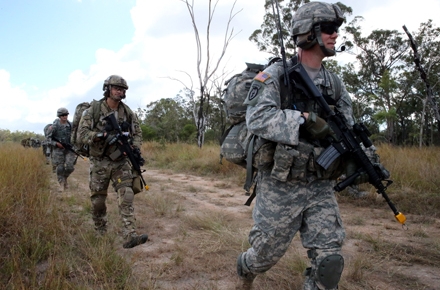Sticking to your guns
JOHN BLAXLAND asks whether the United States is a dangerous, indispensable or convenient ally.
In a bold attempt to redefine Australia's strategic orientation, former prime minister Malcolm Fraser has argued, in his new book Dangerous Allies, that Australia should end its ''strategic dependence'’, calling for the establishment of a ''truly independent Australia''.
This fascinating book provides a useful overview of Australia's dependence for more than a century on ''great and powerful friends''. But is he overstating his case and missing the nuance in Australia's strategic choices?
One can't help but notice Fraser was a key exponent of the Vietnam War, as army minister and then defence minister, and arguably the greatest beneficiary of American pressure on Australian politics in November 1975. The ''road to Damascus''-like conversion on the significance of the US alliance leads one to say: ''Methinks thee doth protest too much!''
Fraser's conversion has seen him argue for a revocation of agreements, including over US Marines in Darwin and the Joint Defence Facility at Pine Gap – what the Australian National University's Desmond Ball called the ''strategic essence'' of the alliance. To Fraser, these entanglements stripped away Australia's freedom of choice. But he conflates issues, painting shades of colour in stark black and white.
Fraser's review of Australian history is strongest when considering the nation's early days and the lead up to federation. But he reduces the difficult choices in response to calls for Australian contributions in recent years as somehow obligatory. To Fraser, alliance ties have removed the element of choice over potential conflicts in Northeast Asia. Yet, unlike the NATO treaty for Europeans, the ANZUS alliance makes no such unavoidable demands or compulsory obligations.
Political leaders, from Whitlam to Howard and beyond, have made their own assessments of what they perceived to be in the national interest.
At times they've been contentious, to be sure, but the notion that Australia had no choice because of the US alliance stretches credulity. Similarly, the idea that an American clash in Asia would automatically trigger Australia's involvement, like it did in the two world wars of last century, simply does not reflect current constitutional reality.
Australian political leaders have more options than that today. To think otherwise also neglects the vagaries of alliances and conflicts. The US, for instance, did not overtly back Britain over the Falklands in 1982 – but provided discreet intelligence support. All parties coped with the tensions this strange set of circumstances generated. Canada did not back the US in Iraq in 2003, but still had exchange officers in US formations and remained part of the ''five-eyes'' intelligence club. And the US did not back us over Confrontation in 1963, and had to be coaxed to assist in East Timor in 1999.
Fraser is to be commended for how he handled the refugee crisis in the late 1970s, when thousands fled war-torn Vietnam. It's a pity his ideas there have not been followed more closely. Yet today, Vietnam, like a range of other regional powers, is quietly encouraging additional US engagement in the region, not less.
Even Indonesia, which has made noises about the Marines in Darwin, has privately been happy that it can now exercise with US Marines nearby without having US bases to deal with. Singapore has bolstered US ties to an unprecedented level. Similarly, Malaysia has sought to deepen and strengthen ties. The Philippines has been stronger than most in its support, signing a revised ''enhanced defence co-operation agreement'' that sees the return of US forces to Philippine bases. With so many regional powers looking to ensure continued American engagement, why would Australia seek to reverse this trend?
Fraser is most critical of the facilities at Pine Gap, suggesting our ''full knowledge and concurrence'' of what happens there means we would automatically be dragged into any conflagration in Asia. This just does not follow. His comments on drones reflect a superficial and unduly conspiratorial understanding of the workings of Pine Gap. Australia's political leaders retain the discretion to commit forces as and when they see fit – knowing that elections are the final arbiter of their decisions. Australia's US ties have, for more than two generations, enabled Australia to maintain a capability edge. Australia has worked assiduously to make the most of the ties – to acquire the best capabilities available and to keep Australia's defence expenditure to a minimum.
Tearing up the agreement on Pine Gap and on the Marines in Darwin would send a strong and negative signal to the region that even the United States' closest and longest ally is walking away. The knock-on consequences on regional security and stability would be incalculable. It would discount decades of investments in capabilities and relationships and would shatter any sense of Australia for anyone in the region looking to us as a trusted and reliable security partner. Such a step would be palpably not in Australia's interests.
Still, maintaining ties with the United States is not a zero-sum option. Developments over the search for Malaysia Airlines flight MH370 point to the merits of collaborating closely with China's armed forces, as we do with a range of regional security partners. Building bridges rather than breaking them is much more constructive and convenient.
John Blaxland is a Senior Fellow at the Strategic and Defence Studies Centre, School of International, Political and Strategic Studies, ANU College of Asia and the Pacific. He is the author of The Australian Army from Whitlam to Howard. Follow him on Twitter at @JohnBlaxland1.
Malcolm Fraser is speaking about his book Dangerous Allies at the Molonglo Theatre, ANU Crawford School of Public Policy on Monday at 5.30pm.
This article was first published by The Canberra Times.







